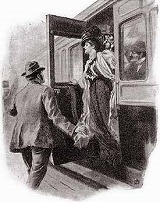“If she wrote the note she was presumably the friend and confederate of Garcia. What, then, might she be expected to do if she heard of his death? If he met it in some nefarious enterprise her lips might be sealed. Still, in her heart, she must retain bitterness and hatred against those who had killed him and would presumably help so far as she could to have revenge upon them. Could we see her, then, and try to use her? That was my first thought. But now we come to a sinister fact. Miss Burnet has not been seen by any human eye since the night of the murder. From that evening she has utterly vanished. Is she alive? Has she perhaps met her end on the same night as the friend whom she had summoned? Or is she merely a prisoner? There is the point which we still have to decide.
“You will appreciate the difficulty of the situation, Watson. There is nothing upon which we can apply for a warrant. Our whole scheme might seem fantastic if laid before a magistrate. The woman’s disappearance counts for nothing, since in that extraordinary household any member of it might be invisible for a week. And yet she may at the present moment be in danger of her life. All I can do is to watch the house and leave my agent, Warner, on guard at the gates. We can’t let such a situation continue. If the law can do nothing we must take the risk ourselves.”
“What do you suggest?”
“I know which is her room. It is accessible from the top of an outhouse. My suggestion is that you and I go to-night and see if we can strike at the very heart of the mystery.”
It was not, I must confess, a very alluring prospect. The old house with its atmosphere of murder, the singular and formidable inhabitants, the unknown dangers of the approach, and the fact that we were putting ourselves legally in a false position all combined to damp my ardour. But there was something in the ice-cold reasoning of Holmes which made it impossible to shrink from any adventure which he might recommend. One knew that thus, and only thus, could a solution be found. I clasped his hand in silence, and the die was cast.
But it was not destined that our investigation should have so adventurous an ending. It was about five o’clock, and the shadows of the March evening were beginning to fall, when an excited rustic rushed into our room.
“They’ve gone, Mr. Holmes. They went by the last train. The lady broke away, and I’ve got her in a cab downstairs.”
“Excellent, Warner!” cried Holmes, springing to his feet. “Watson, the gaps are closing rapidly.”
In the cab was a woman, half-collapsed from nervous exhaustion. She bore upon her aquiline and emaciated face the traces of some recent tragedy. Her head hung listlessly upon her breast, but as she raised it and turned her dull eyes upon us I saw that her pupils were dark dots in the centre of the broad gray iris. She was drugged with opium.

“I watched at the gate, same as you advised, Mr. Holmes,” said our emissary, the discharged gardener. “When the carriage came out I followed it to the station. She was like one walking in her sleep, but when they tried to get her into the train she came to life and struggled. They pushed her into the carriage. She fought her way out again. I took her part, got her into a cab, and here we are. I shan’t forget the face at the carriage window as I led her away. I’d have a short life if he had his way - the black-eyed, scowling, yellow devil.”
We carried her upstairs, laid her on the sofa, and a couple of cups of the strongest coffee soon cleared her brain from the mists of the drug. Baynes had been summoned by Holmes, and the situation rapidly explained to him.
“Why, sir, you’ve got me the very evidence I want,” said the inspector warmly, shaking my friend by the hand. “I was on the same scent as you from the first.”